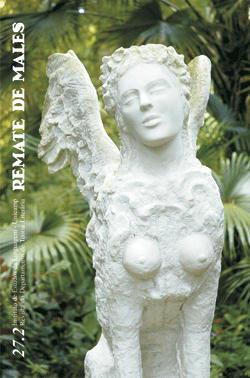Resumo
Rómulo Gallegos was a chronicler of his place and time. The charm projected on his spirit by the stories of an optimistic modernity led his firm hand in the design of an image of a modern nation for Venezuela, inspired by the possibility of progressive knowledge, social and moral improvement, and the re-establishment of a policy associated to virtue and law. An acknowledgement of foundations was inherent to that charm, as well as the notion of model, so dear to the western tradition that demanded quality, insisted on values, and recommended or prescribed lifestyles, two axes of a project that could be achievable due to the best regulatory device, Education. In this article I examine how writing was for Gallegos a cultural practice essentially associated to these axes and to that device because of its mission character and its possibility to organize multiple or complex realities. This cultural practice was also the way to canalize its programmatic pulse through performative statements that showed the Venezuelan reality and made the public believe what that reality was like in the view of a group that even standing against-power, enjoyed part of the monopoly of the discursive production of that reality. From this position I focus on Pobre negro (1937) and I establish its connection to some XIXth century scholars through the élan pédagogique or bequest of the Illustration, in the deep conviction that “education could do everything”.Referências
ALTAMIRANO, Carlos (1999). “Ideas para un programa de Historia Intelectual”, Prismas Nro. 3: 202-208.
ANDERSON, Benedict (1987). Imagined Communities. London-New York: Verso.
ARAUJO, Orlando (1972). Narrativa venezolana contemporánea. Venezuela: Edit. Tiempo Nuevo.
ARMSTRONG, Nancy (1991). Deseo y ficción doméstica. Madrid: Cátedra.
BAECHLER, J. (1997). “La universalidad de la nación”, M. Gauchet, P . Manent y P . Rosanvallon (dir.), Nación y modernidad. Bs. As: Nueva Visión: 9-28.
BACZKO, Bronislaw (1991). Los imaginarios sociales. Memorias y esperanzas colectivos, Bs. As.: Nueva Visión.
BAUMAN, Zygmunt (1997). Legisladores e Intérpretes (Sobre la modernidad, la postmodernidad y los intelectuales). Bs As: Univ. de Quilmes.
BELLO, Andrés (1976). Antología de Discursos y escritos. (Edición preparada por José Vila Selma). Madrid: Editorial Nacional.
BOLÍVAR, Simón (1979). Doctrina del Libertador (Prólogo de Augusto Mijares, Compilación, notas y cronología de Manuel Pérez Vila). Venezuela: Biblioteca Ayacucho.
BOURDIEU, Pierre (1995). Las reglas del arte. Barcelona: Anagrama.
CHARTIER, Roger (1992). El mundo como representación. Barcelona: Gedisa.
GALLEGOS, Rómulo (1909). ”El Factor Educación”. La Alborada Nro. IV .(Edición facsimilar. Biblioteca del CELARG).
GALLEGOS, Rómulo (1981). Pobre negro. Bs. As. Espasa-Calpe.
GALLEGOS, Rómulo (1977). “Una posición en la vida”, Vida y Literatura, Bs. As: Publicación de la Embajada de Venezuela.
GELLNER, E. (1991). Naciones y nacionalismo. Madrid- Bs. As.: Alianza Editorial.
GONZÁLEZ STEPHAN, Beatriz (1994). “Escritura y modernización: la domesticación de la barbarie”, Revista Iberoamericana, vol LX, Nros. 166-167 : 109-124.
JITRIIK, Noé (1992). Historia de una mirada. El signo de la cruz en los escritos de Colón. Bs As: Ediciones de la Flor.
LYOTARD, J.F. (1987) La condición postmoderna. Madrid: Cátedra.
MARINONE, Mónica (1999). Escribir novelas. Fundar naciones. Venezuela: El libro de Arena.
MARINONE, Mónica (2006). Rómulo Gallegos. Imaginario de Nación. Venezuela: El Otro El Mismo.
MILIANI, Domingo (1985). Tríptico venezolano. Caracas: Fundación de Promoción Cultural de Venezuela.
ORTIZ, Renato (1996). Otro territorio. Ensayos sobre el mundo contemporáneo. Bs. As: Universidad Nacional de Quilmes.
PICÓN SALAS, Mariano (1983). “Comprensión de Venezuela”, Viejos y nuevos mundos. Caracas: Biblioteca Ayacucho: 9-143.
RANGEL, Domingo A. (1974). Los andinos en el poder. Caracas: Vadell Hnos.
RENÁN, Ernest (1990). “What is a Nation?”, Nation and Narration, Bhabha, Homi (Coord.), London and New York: Routledge: 9-22.
RODRÍGUEZ, Simón (1982). INVENTAMOS O ERRAMOS. Caracas: Monte Avila Rodríguez, Simón (1990). Sociedades americanas. Venezuela: Biblioteca Ayacucho.
ROUSSEAU, Juan. J (1999). Emilio o De la Educación. México: Porrúa.
SARMIENTO, Domingo F (1900). Obras. Bs As: Belín Sarmiento Editor.
TOUCHARD, Jean (1975). Historia de las ideas políticas. Madrid: Tecnos.
WEINBERG, Gregorio, “Condorcet y la instrucción pública”, s/d.

O periódico Remate de Males utiliza a licença do Creative Commons (CC), preservando assim, a integridade dos artigos em ambiente de acesso aberto.

